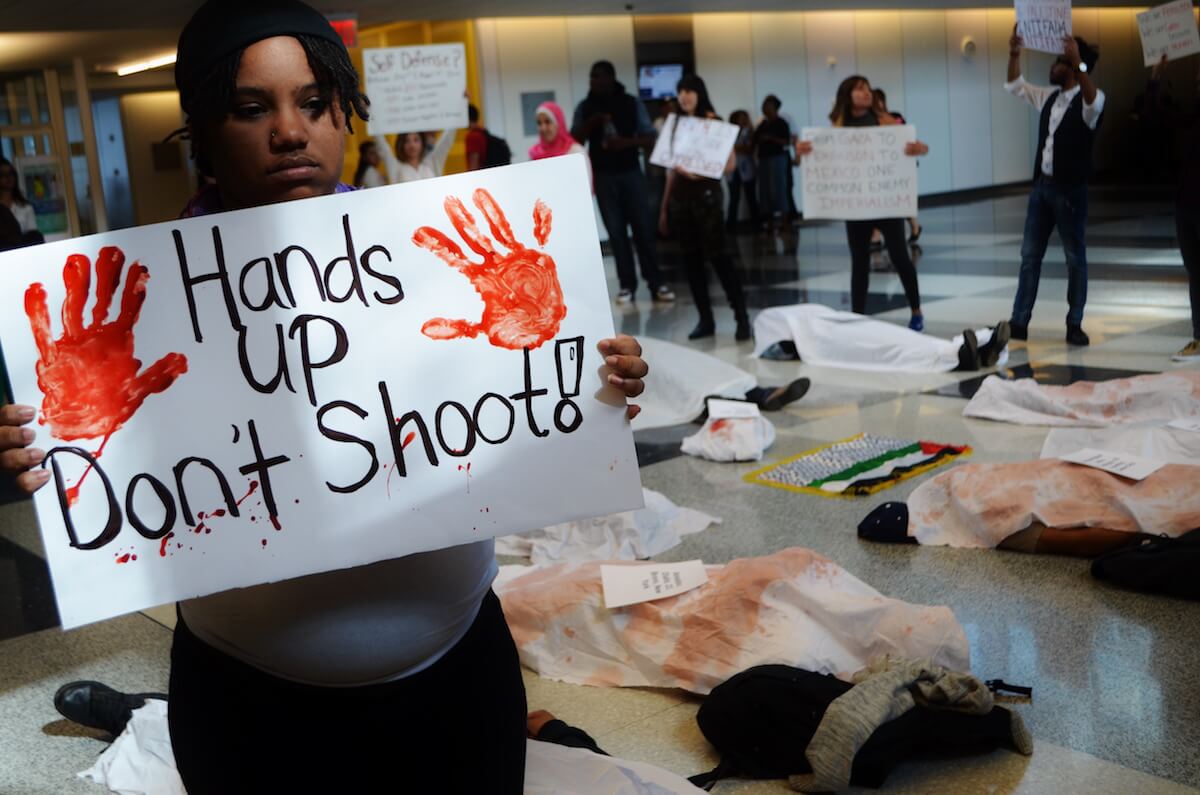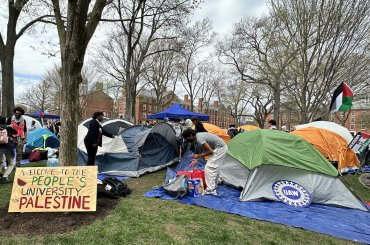A Response to Mohammed Alhammami’s ‘A letter from Gaza to black America‘:
Earlier today I read a letter from Palestine that relates oppression between Blacks’ in America and Palestinians living under Israeli military occupation. The letter urges both groups to unite in the fight against worldwide injustice. As a student I studied the Israeli occupation, and heavily touched by this letter I felt compelled to write a response.
I am an African American, born and raised just outside of Detroit, MI. The effects of slavery continue to ripple post-traumatic effects throughout my community. When I think about my history I think about how little I must know. I think about the fact that in my ancestry search I will have to try to find my family members on white men’s deeds, listed as property. In my history I’m constantly reminded that for the greater part of America’s existence I was not entitled to American wealth, freedom, education or basic human rights. I also know a great majority of my past has been hidden from me in order to protect those who’ve hidden it, from their consequences, their debts and shame. I wonder how someone’s shame is more important than another’s humanity? And then I remember that I am Black in America. I wonder how we could escape effects that slavery has left imprinted within the fabric of this country or if it is even possible. Until recently I’d felt as though the African American community was alone in the fight against these types of injustices.
Until recently I’d felt as though the African American community was alone in the fight against these types of injustices. Injustice that creates a wall of oppression so strong that a group of people are helpless under the weight of that oppression and left trapped in a cycle of poverty and helplessness. Did our being taken from Africa leave us disconnected form the world? Did centuries of our abuse and torture within white supremacist culture leave us unattached from the rest of the people of color around the world suffering under that same culture?
After reading your letter I’m hopeful that the connection between Black people in America and people of color around the world, which has always been present, will only continue to strengthen. People of color represent the vast majority of the world’s population, although they call us a ‘minority’, whites are actually the world minority and our inability to connect with the rest of the world blinds us of that fact.
I am thankful that Spring of last year while I was enrolled at the University of Washington I was able to study Middle East Politics under the instruction of Karam Dana, who’d joked to the class that he never gave a 4.0 score. Dana, a Palestine scholar and political scientist, gave me a 3.9 in the course, a class that I was initially intimidated by, thinking that it would be too ‘global’ for me to understand. Little did I know that I would feel passionate about learning about a crisis that connected me globally to people who spoke a different language, followed a different religion and lived on the other side of the world. I realized that none of those difference mattered, they were only used to divide. The limited information I had been taught about the Middle East in primary education was done in order to keep me uninformed and disconnected from the world around me.
Black Americans are blinded by the lack of access to information about the world outside of the U.S, and very few of us are able to learn about the Middle East in a university setting under the instruction of a Palestine scholar. I’m thankful to have had this experience to have also run into this letter.
Dear Brothers and Sisters in Palestine, I am not Palestinian. But like you, I am not White.
Like you, my people are also victims of our government’s disregard of several international laws;
Like you, gross and excessive force has been used against citizens within our community;
Like you, my people are also victims of militarized state forces;
Like you, little to no action is taken to defend the deaths of members of our community by state forces;
Like you, the media portrays negative images of my people in order to ‘other-ize’ us within society;
Like you, our leaders are committed to keeping the masses uneducated;
Like you, there is an exponential wage gap between the average incomes of my people in comparison to the whites’ average incomes;
Like you, an ethnic cleansing of our people is occurring on our land;
Like you the psychological condition of our children is suffering.

I recognize, as a Black person in America, exactly how the media paints an improper picture in order to criminalize and justify the mistreatment of a population. Like you I know that the media and the government criminalize the Middle East in order to keep us divided and unconcerned. I know that American media systematically withholds facts in order to manipulate information, knowing that occupation is against international law. Israeli military forces have been breaking international law by occupying in Palestine, including the Gaza strip, for decades. Forces abuse Palestinians: limiting their ability to travel, trapping them in small areas surrounded by military ‘check points’, restricting their freedom of movement, stripping them of their resources and leaving them in poverty. Palestinian families living for centuries on their land were violently removed from their homes, relocated and forced to live under military occupation. Is this not a force to resist? And in your resistance you are also abused and killed.
As you mentioned in your letter, the outrage over Colin Kaepernick’s silent and peaceful protest, proves that there is no ‘right’ way to resist, especially in the eyes of the oppressor. There is no right way to protest in the eyes of the enemy, the only appropriate behavior is to “get over it” and quietly comply. When we aren’t making our enemy angry then we are not properly fighting back. We must aim to agitate and infuriate our oppressor. We will remain weak if we stay divided. As long as we feel alone in our oppression we will act as if we are alone, being forced to be silent and comply to the injustices affecting us. I momentarily felt alone in the fight against injustice, but Alhammami appropriately mentions King as he relates to Black Americans, “I do not have to be black to understand the words of Marin Luther King Jr. when he said, ‘Injustice anywhere is a threat to justice everywhere.’ I am a Palestinian who is extending his arms in brotherhood to another people who know and live my legacy of oppression.” This is a worldwide fight against a white supremacist culture that oppresses people of color. I am a Black woman standing in solidarity with Palestinians.
All Power to the People, all the People!
This post originally appeared on Amani Sawari’s website sawarimi.org.



‘As you mentioned in your letter, the outrage over Colin Kaepernick’s silent and peaceful protest, proves that there is no ‘right’ way to resist, especially in the eyes of the oppressor’. Exactly right. You’re damned if you do and damned if you don’t. Thanks for offering this piece of your heart and soul.